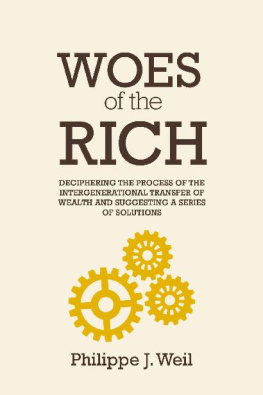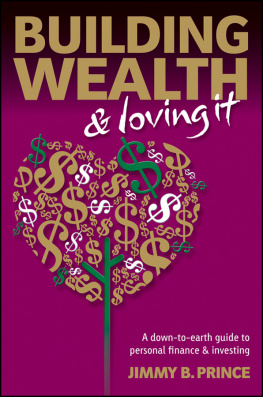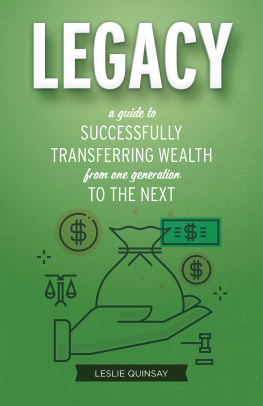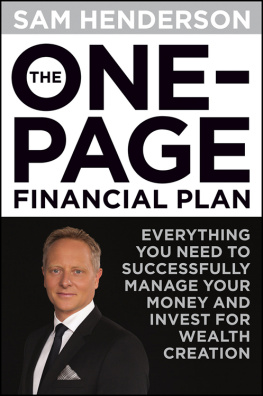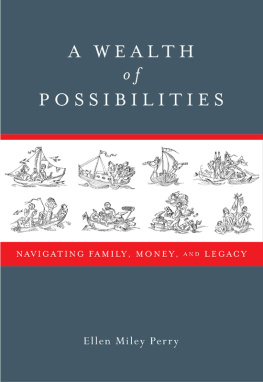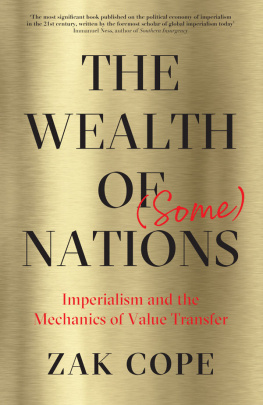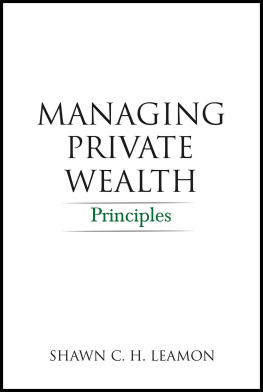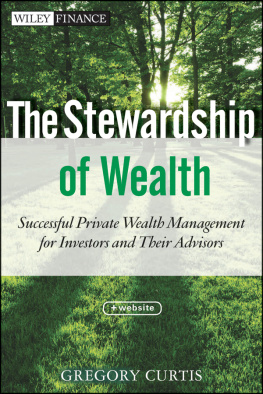Woes of the Rich
Seeing Beyond the Money
Philippe Weil
Revised version based on the hebrew original.
Translated by Judy Kupferman, Tel Aviv
Edited by Margo Eyon, Kfar Azar
P. J. Weil and P. J. Weil Ltd., 2017/2019
www.pjweil.com
+972-3-5104848
The stories in this book contain many grains of truth, but should be read as fiction the names, characters, businesses, places, events and incidents are either products of the authors imagination or used in a fictitious manner, to illustrate the authors professional points. Any resemblance or affinity to actual persons, living or dead, or actual events is purely coincidental.
Throughout the book, gender-specific terms may be used to ease the text flow, but should be understood as referring to both genders, unless explicitly stated.
Contents
Word from the Author
Just as I finished writing this book, my father Ernst Weil passed away.
I see a certain symbolism in the timing, because the values I was brought up with are the same values that have guided me over the years in working with families, and this book is my homage to those values from home instilled in me by my parents. They knew how to enjoy this world and extract the best from it. A significant part of my knowledge and my passion for helping wealthy families stems from the education I received and from the community in which I grew up.
Dividing my time between one of the capitals of old money and one of the youngest economies of the Western world gives me insight into different issues faced by families of wealth. Switzerland is the quintessential master of catering to multigenerational families and preserving wealth for generations on end; while Israel is a young, dynamic country with hi-tech entrepreneurs who got rich quick by striking startup gold, and business families that are barely in the second or third generation.
This book brings together my findings from the old and new worlds. It describes a special world where money plays an important role but can be destructive at times if not properly managed. The main idea is always to see the whole picture rather than just a splash of color, and to constantly search for comprehensive solutions that will preserve both the financial strength and the personal balance in affluent families. Solutions for the very real problems faced by these wealthy families are always highly individual and meticulously custom-designed.
Woes of the Rich grants readers the inspiration and tools to ignite the long overdue conversation about family and money.
Philippe J. Weil
Tel Aviv, 2019
Preface
In August 1996, I moved from Switzerland to Israel. In the taxi from Ben Gurion Airport, I told the driver excitedly that I had come to live in Israel. He gave me a look.
A Swiss native moving to Israel in August? Are you sure?
I had rarely been so certain of anything. I had known Israel since my childhood, and on each visit I felt more and more strongly that I belonged here. In addition, I was convinced that Tel Aviv would soon become the gate of peace to the Middle East, and the entire area would flourish. So even from a practical viewpoint, the timing for my Aliyah seemed perfect to me.
At the end of the journey, when we stopped at the entrance to my building, the driver took my suitcase out of the trunk and placed it by the elevator. He parted from me with a handshake and wished me good luck.
The next day I went to meet Avraham Burg, who was chairman of the Jewish Agency at the time. We had met in Switzerland. Until May of 1996 I had voluntarily served as president of Keren Hayesod (the United Israel Appeal) in Zurich. I raised funds for it and I myself donated a considerable sum of money. Ironically, the organization to which I had made a contribution now helped finance my arrival in Israel by virtue of its role in encouraging Aliyah , but thats another story. Now in Israel, I felt that the time had come to live as a sworn idealist and take part in Zionist activity, as I had always wished. Therefore, I considered starting to work at the Jewish Agency. Burg listened to me, and after a few minutes of conversation he said, Philippe, youre a Swiss banker, thats your area of expertise, and thats the best way that you can contribute to Israel. We need people like you.
And so that is what I did. After three months of ulpan , I began to work at one of the Israeli banks, in the international department of private banking. My knowledge of European work methods, along with all the languages I knew, were critical to the position, but I quickly understood that there was no resemblance between Israeli private banking and Swiss private banking, both for regulatory reasons and due to differences in work methods and the customer service ethic. These were two different entities, and the first labor strike at the Israeli bank made this quite clear to me. The workers were demanding a transition to five work days per week, and I wondered how I was to explain to European clients that I couldnt provide them with service because of a strike.
In Switzerland, private banking is founded on holistic management of wealthy clients finances and the provision of comprehensive solutions. In Israel, asset management and banking were separated to protect clients, following a banking crisis in the 1980s. As a result, banks increasingly serve only the banking needs of its clients without having access to the whole picture. From experience, I knew that this method of management misses its mark. Successful family financial management requires holistic banking, because the financial angle despite its enormous importance is never the whole story, which must be taken into account at all times, from the private clients viewpoint.
After four years I left the bank and decided to open a family office, based on the knowledge and experience I had gained in my work in family wealth management in Switzerland. Today the term family office is common and almost self-explanatory, but such was not the case at the end of the 1990s. The decision to open a family office was indeed based on experience and a belief that this was the right thing to do, but I knew it would be a long road. I began by giving partial services to families asset management, counseling on investments in Israel, conversations about wills, advice in managing inheritances anything that could aid my clients in better managing their family and their wealth.
And then I met Jay Hughes an American attorney and sixth-generation businessman, who had become famous through his books, articles and lectures on subjects related to family wealth. In the 90s Hughes had become fed up with his work as an attorney dealing with wills, prenuptial agreements, trusts and legacies, because he felt that it was missing the point. I worked, I talked and I persuaded, he told me at our first meeting, and at the moment of truth, conflicts among family members were always revealed. All the advice, requests and instructions left by the fathers of the families were apparently not sufficient to prevent future conflict. Following this professional insight, Hughes concluded that contracts and agreements among family members with joint businesses and joint wealth could not take the place of discussion and communication. He was among the first to develop the intuitive idea that capital is not solely a financial component, and that a multigenerational family includes five types of capital, each with its own importance and place in the overall family and each producing different kinds of yields. In addition to financial capital , Hughes also defined:
Intellectual capital
Family members who have developed outside the family business and can contribute their knowledge to the family.

